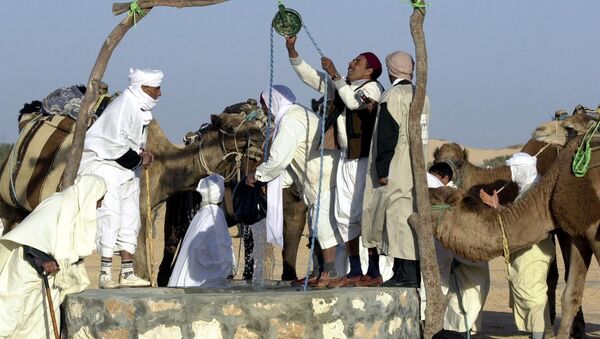Khatim Kherraz, executive secretary of the Sahara and Sahel Observatory (OSS), has told Sputnik that the water resources of the Maghreb countries, including Algeria, Libya, Morocco, Mauritania and Tunisia, are running out.
"There is water [in the Maghreb countries] but people do not have access to it, because energy is needed […], and the countries do not have the means to use the necessary electricity or solar energy, or to drill or arrange distribution networks," Kherraz said.
He expressed surprise about reluctance of the OSS's financial partners, such as the World Bank, UNESCO, the African Union and the European Union, to deal with water shortage-related problems pertaining to the Maghreb countries.
#Africa is planting their very own Great #Green Wall that stretch across the whole of Africa, which helps stop #desertification and create new jobs! Watch here: https://t.co/8N9dRCMRlf pic.twitter.com/iCdZZ99jRs
— Gone Adventurin' (@GoneAdventurin) 20 ноября 2017 г.
Herraz attributed all this to the global community's desire to shift its focus to resolving climate change.
According to him, at present, states and other donors "tend to give preference to climate change-related problems, forgetting that […] many decisions related to these problems depend on the development of water resources."
"Trying to get funding for a project that only pertains to water, you will not achieve anything. But if you ask for funding for a project related both to water resources and climate change, you will increase your chances," he pointed out.
Herraz also mentioned the actual failure of the he so-called Grand Green Wall project, one of the most ambitious initiatives against the desertification of Africa. He said that this old ambitious project had to be reviewed because "the desert has proved to be the strongest."
Restoring degraded landscapes increases food security, cuts poverty & reduces forced migration according to experts at #ActionAgainstDesertification workshop in #Niger #GreatGreenWall https://t.co/fGHafKap9F pic.twitter.com/zF0wqH4N0W
— FAO Forestry (@FAOForestry) 17 ноября 2017 г.
"Due to insufficient funding, the Great Green Wall has been reduced to several mini-projects in the territories that should be protected first and foremost. Using funds allocated by the OSS and a spate of countries, concentric green walls have been erected around agricultural lands or cities being affected by desert," he explained.
Herraz added that the states need more money in order to try to link these green territories with each other.
In the Sahara Region of Africa, the GREAT GREEN WALL initiative is well underway and is proposing to be the largest living structure on the planet. pic.twitter.com/xkp5qg2biQ
— Grandmother Earth (@grandmotherurth) 19 ноября 2017 г.
Approved by the African heads of state in 2005, the Great Green Wall aims to tackle climate change and desertification by growing a line of trees and creating green landscapes across North Africa, including the Maghreb countries.
READ MORE: Can Hydrogen Vehicles Become Part of the Solution to Climate Change?
The UN predicted in 2015 that over 50 million people will be forced to leave their homes by 2020 because their land has turned to desert. The BBC adds that families who live off the land often feel that they have no choice but to migrate.




